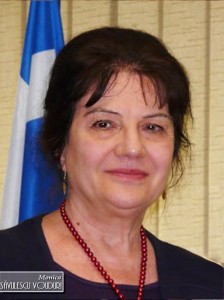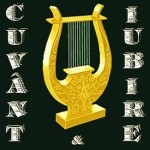Monica Săvulescu Voudouri: Poduri lirice (poeme bilingve)
 Monica Săvulescu Voudouri s-a născut la Galaţi în 1942. Liceul l-a făcut la Cluj, a absolvit Filosofia la Universitatea din Bucureşti şi tot aici şi-a susţinut, în 1974, doctoratul în filosofie. În 1985 a emigrat în Olanda, iar din 2007 trăieşte în Grecia, la Atena. În ultimii 20 de ani, a lucrat ca sociolog în centre europene de cercetare specializate în socio-psihologia imigraţiei.
Monica Săvulescu Voudouri s-a născut la Galaţi în 1942. Liceul l-a făcut la Cluj, a absolvit Filosofia la Universitatea din Bucureşti şi tot aici şi-a susţinut, în 1974, doctoratul în filosofie. În 1985 a emigrat în Olanda, iar din 2007 trăieşte în Grecia, la Atena. În ultimii 20 de ani, a lucrat ca sociolog în centre europene de cercetare specializate în socio-psihologia imigraţiei.
Monica scrie poezie, proză, eseu, cronică de teatru, studii de sociologie. De asemenea, traduce din literatura olandeză. A publicat în România, Olanda, Grecia, Anglia, Peru etc. A luat câteva premii literare în România şi în Olanda.
În ultimii ani i-au apărut: „Fetele Nikas, în lumina zilei mare şi albă” (roman, tradus în câteva limbi), „Vă scriu din Atena, în anii crizei” (povestiri), „Dacă treci podul Soweto” (roman), „Ce nu ştie un non-migrant” (culegere de articole apărute în revista Cultura din Bucureşti).
Este preşedinta Societăţii Culturale „Balkania Contemporană” din Atena, înfiinţată în 2004. Este de asemenea membră a Uniunii Scriitorilor din România, din Olanda şi din Belgia. În curs de apariţie, volumul de poezii „Acolo, aici, pretutindeni, just people”. Monica comentează: „Pentru mine, a scrie poezie înseamnă ca şi literatura, în general, o încercare, pe cât posibil, de a-ţi înţelege destinul.”
***
Monica Săvulescu Voudouri was born in Galaţi in 1942. She went to high school in Cluj, and graduated Philosophy at University of Bucharest. In 1974, she obtained a PhD in Philosophy from the same university. She emigrated to the Netherlands in 1985 and now lives in Athens, Greece since 2007. Over the past twenty years she worked as a sociologist in European research centres specialized in socio-psychology of immigration.
Monica writes poetry, prose, essays, theatre critiques and sociology studies. She also translates from Dutch literature. She published her work in Romania, the Netherlands, Greece, England, Peru, etc. Her work received several literary awards in Romania and the Netherlands. In recent years, she has published: „Nikas Girls, in Large and White Daylight” (novel, translated into several languages), „I write from Athens during crisis years” (stories), „If You Pass the Bridge Soweto” (novel), „What a Non-Migrant Doesn’t Know?” (collection of articles published in The Culture magazine in Bucharest).
She is the president of Balkania Contemporary Cultural Society of Athens, founded in 2004. She is also a member of the Writers’ Union of Romania, the Netherlands and Belgium. She is about to publish the volume of poems „There, There, Everywhere, Just People”. Monica comments: ‘Writing poetry for me is like literature in general, an opportunity, where possible, to understand your destiny.’
***.
1.
Umblu prin lume
de la un capăt la altul,
peste tot sunt acasă,
peste tot sunt străină
Tot mai mult mă gândesc
la băiatul acela, nazaritheanul,
care simţise şi el
că împărăţia pe care o căuta
nu e pe lumea aceasta.
Doar că el apucase să treacă
doar prin deşert.
Dar dacă ar fi fost mai umblat?
N-ar fi încercat el să scape
dintre cei doi tâlhari?
Poate că undeva, în alt loc,
şi-ar fi găsit altă cruce.
1.
I am walking through the world
from one end to the other,
I’m at home everywhere,
I’m a foreigner everywhere.
More and more I’m thinking
of that boy, the Nazarene,
who also felt
that the Kingdom he was looking for
was not on this world.
He had only managed to go
through the desert.
What if he would have travelled more?
Wouldn’t he have tried to escape from
the two robbers?
Maybe somewhere, in a different place,
he would have found a different cross.
2.
Traversând viaţa,
ca o cămilă deşertul,
pas după pas,
pas după pas.
Nimeni nu o întreabă
cât e de obosită
şi nici ea nu dă
nici un semn de extenuare.
Pas după pas,
pas după pas.
astăzi ca ieri,
ieri ca alaltăieri.
Pănă-n clipa în care
cade-n genunchi
şi-şi dă sufletul.
Cum aşa!!!
se aud murmure nemulţumite
în caravană.
2.
I’m passing through life,
like a camel in the desert,
a step at a time,
a step at a time.
No one asks her
how tired she is
and also she doesn’t show
any sign of exhaustion.
A step at a time,
a step at a time.
today like yesterday,
yesterday like the day before.
Until the moment when
she falls to her knees
and her soul passes away.
How come!!!
unhappy murmurs are heard
in the caravan.
3.
Sunt ca în dansul grecesc,
cu braţele în aer, cu un picior
la câteva palme deasupra pământului
într-un echilibru precar,
temporar,
aşteptând lovitura destinului.
Apoi,
dansatorul se-apleacă brusc la pământ,
nu-ngenunchiază,
dar îşi adună puterile,
ca s-o ia de la capăt.
Mă tem că eu acest pas,
următor,
n-am să ştiu să-l mai fac.
Cândva,
undeva,
am pierdut o măsură.
3.
I’m like in the Greek dance,
with my arms in the air, with one leg
just a few palms above the ground
in a precarious, temporary
balance,
waiting for my destiny’s blow.
Then,
the dancer, suddenly leans towards the ground,
not kneeling,
but gathering strength
to start again.
I’m afraid that
I didn’t know how to take
this step, the next one.
Sometime,
somewhere,
I lost a beat.
